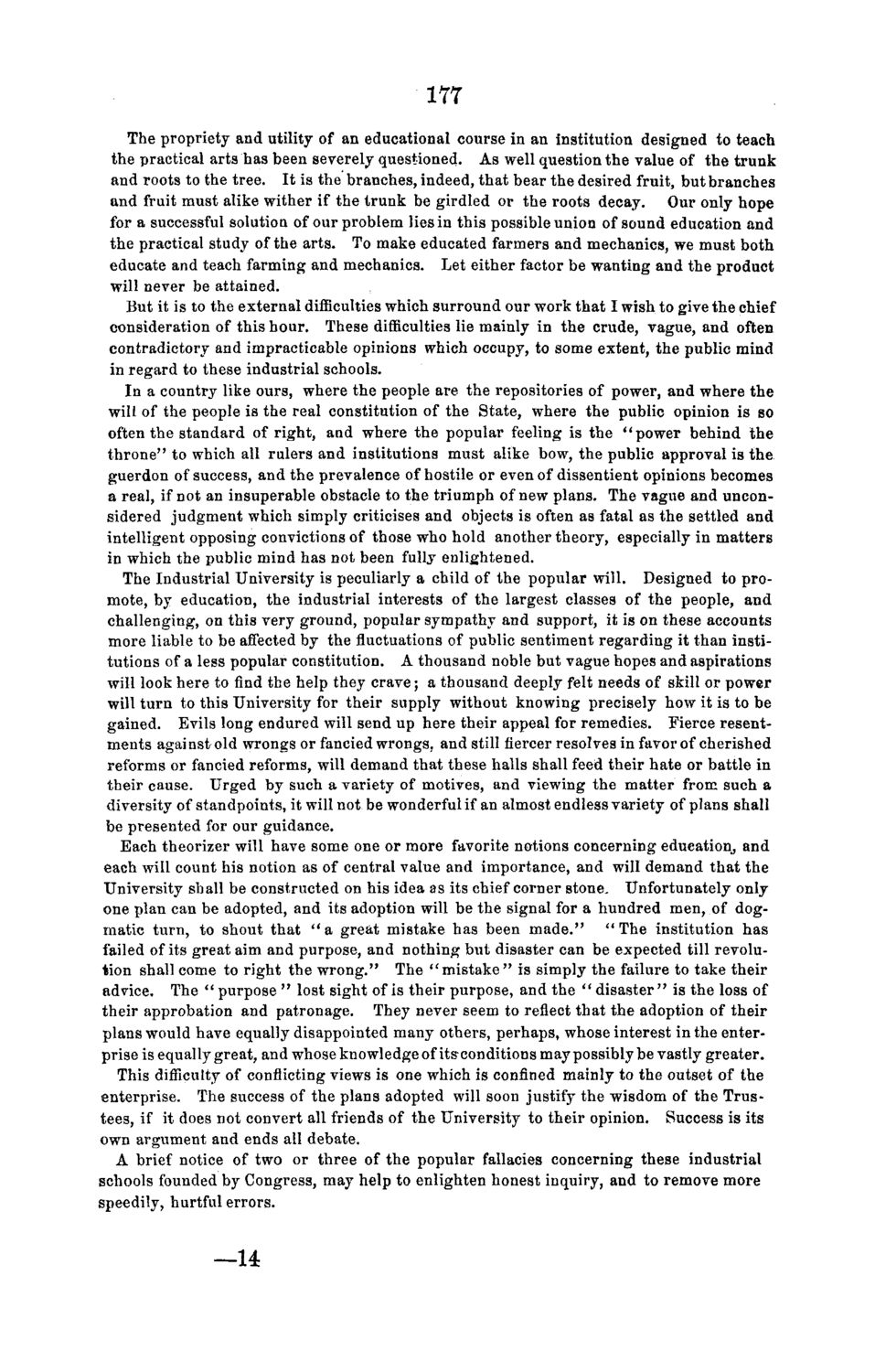| |
| |
Caption: Board of Trustees Minutes - 1868
This is a reduced-resolution page image for fast online browsing.

EXTRACTED TEXT FROM PAGE:
177 The propriety and utility of an educational course in an institution designed to teach the practical arts has been severely questioned. As well question the value of the trunk and roots to the tree. I t is the branches, indeed, that bear the desired fruit, but branches and fruit must alike wither if the trunk be girdled or the roots decay. Our only hope for a successful solution of our problem lies in this possible union of sound education and the practical study of the arts. To make educated farmers and mechanics, we must both educate and teach farming and mechanics. Let either factor be wanting and the product will never be attained. But it is to the external difficulties which surround our work that I wish to give the chief consideration of this hour. These difficulties lie mainly in the crude, vague, and often contradictory and impracticable opinions which occupy, to some extent, the public mind in regard to these industrial schools. In a country like ours, where the people are the repositories of power, and where the will of the people is the real constitution of the State, where the public opinion is so often the standard of right, and where the popular feeling is the " p o w e r behind the t h r o n e " to which all rulers and institutions must alike bow, the public approval is the guerdon of success, and the prevalence of hostile or even of dissentient opinions becomes a real, if not an insuperable obstacle to the triumph of new plans. The vague and unconsidered judgment which simply criticises and objects is often as fatal as the settled and intelligent opposing convictions of those who hold another theory, especially in matters in which the public mind has not been fully enlightened. The Industrial University is peculiarly a child of the popular will. Designed to promote, by education, the industrial interests of the largest classes of the people, and challenging, on this very ground, popular sympathy and support, it is on these accounts more liable to be affected by the fluctuations of public sentiment regarding it than institutions of a less popular constitution. A thousand noble but vague hopes and aspirations will look here to find the help they crave; a thousand deeply felt needs of skill or power will turn to this University for their supply without knowing precisely how it is to be gained. Evils long endured will send up here their appeal for remedies. Fierce resentments against old wrongs or fancied wrongs, and still fiercer resolves in favor of cherished reforms or fancied reforms, will demand that these halls shall feed their hate or battle in their cause. Urged by such a variety of motives, and viewing the matter from such a diversity of standpoints, it will not be wonderful if an almost endless variety of plans shall be presented for our guidance. Each theorizer will have some one or more favorite notions concerning education, and each will count his notion as of central value and importance, and will demand that the University shall be constructed on his idea as its chief corner stone. Unfortunately only one plan can be adopted, and its adoption will be the signal for a hundred men, of dogmatic turn, to shout that " a great mistake has been m a d e . " " T h e institution has failed of its great aim and purpose, and nothing but disaster can be expected till revolution shall come to right the w r o n g . " The " m i s t a k e " is simply the failure to take their advice. The " purpose " lost sight of is their purpose, and the " disaster " is the loss of their approbation and patronage. They never seem to reflect that the adoption of their plans would have equally disappointed many others, perhaps, whose interest in the enterprise is equally great, and whose knowledge of itsconditions may possibly be vastly greater. This difficulty of conflicting views is one which is confined mainly to the outset of the enterprise. The success of the plans adopted will soon justify the wisdom of the Trustees, if it does not convert all friends of the University to their opinion. Success is its own argument and ends all debate. A brief notice of two or three of the popular fallacies concerning these industrial schools founded by Congress, may help to enlighten honest inquiry, and to remove more speedily, hurtful errors. —14
| |